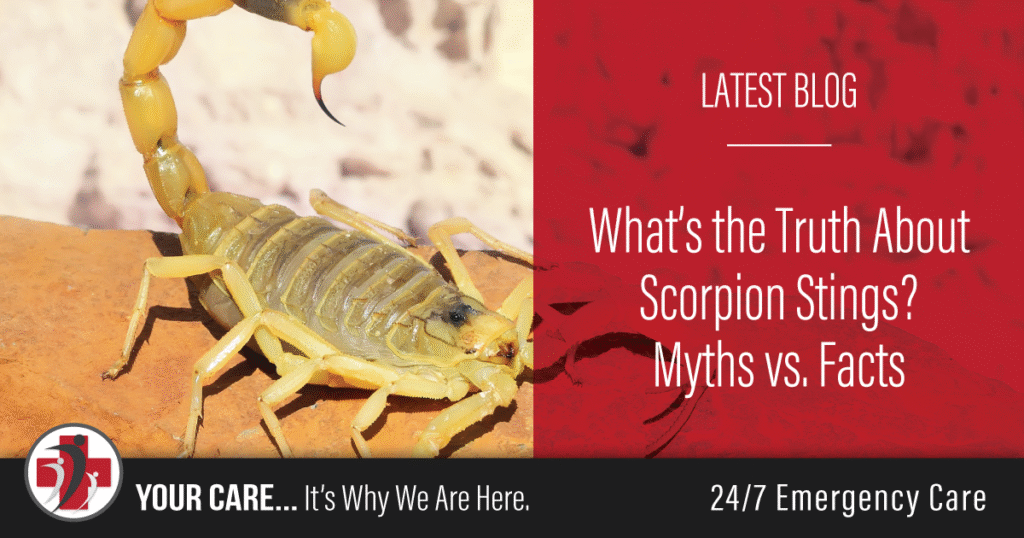With the summer temperatures soaring across the great state of Arizona, many families take advantage of the cooler temperatures of nighttime by heading out in the dark to run errands, socialize or play night games. Unfortunately, there are other creatures who prefer the summer nighttime hours as well, and they don’t often like sharing their spaces. The much-feared scorpions come out to hunt their prey after the sun goes down. Scorpion stings are a legitimate concern in Arizona, with an estimated 2,500-3,000 stings reported to the Arizona Poison and Drug Information Center each year.
We hear a lot of misconceptions about scorpion stings in Arizona, and we want our patients to be as educated as possible. Especially since we’re currently in the middle of their active season, we would like to take this opportunity to separate fact from fiction about scorpion danger in Arizona.
Myth: All scorpion stings are created equal
Truth: In North America, the only known scorpion that is confirmed to cause envenomation, or has venom potent enough to cause severe or life-threatening symptoms in people, is the Arizona bark scorpion. These scorpions are prevalent in Arizona, and are typically found in dark, damp environments (think: laundry rooms, bathrooms, in clothing, or near food). They are skilled climbers on many surfaces but cannot climb clean plastic or glass.
Myth: Baby scorpions are more venomous than full-grown scorpions
Truth: The danger of scorpions is determined by their species, and not by their age or size. The venom in a scorpion’s stinger remains the same throughout its life.
Myth: Scorpions go into hibernation during the winter
Truth: They become slightly less active in cold temperatures, but don’t hibernate. They will often gravitate to indoor dwellings to keep warm during cooler months.
Myth: Scorpions only come out at night
Truth: Scorpions are nocturnal, and are most active at night, but they can also be active during the day, especially if they’re disturbed. It’s important to take care when moving outdoor furniture or pool covers or reaching into shaded areas.
Myth: You’ll always be able to tell if you’ve gotten stung
Truth: While some scorpion stings are very painful, some people report not feeling the sting at all. And not every scorpion sting leaves visual evidence such as a puncture mark or swelling.
Myth: Scorpions will attack people unprovoked
Truth: They are considered nonaggressive and will usually not attack humans unless they are unintentionally touched.
Even though scorpions are an unavoidable part of living in Arizona, you don’t have to live in fear. Being properly educated about the facts and myths regarding scorpion stings can help you avoid them as well as be prepared and calm if you encounter one. The exceptional medical team at the Fountain Hills Medical Center is trained to evaluate and treat scorpion stings effectively and quickly. Our doors are always open, and we’re equipped to handle your medical emergency in Fountain Hills with care, compassion, and skill.

